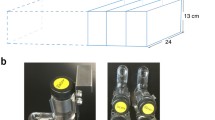Abstract
Chronic exposure to mild unpredictable stressors (CMS) has previously been found to reduce the consumption of palatable, sweet solutions in rats. In the present study, the utility of this procedure was assessed in mice. Male AP mice subjected to CMS showed reduced consumption of a 2% or 4% sucrose solution. This effect was reversed by chronic (3 weeks) treatment with the tricyclic antidepressant imipramine (20 mg/kg per day). These results extend previous reports of a generalized decrease in sensitivity to reward (anhedonia) in rats caused by CMS and the efficacy of antidepressant treatment in this paradigm. Chronic unpredictable mild stress in mice appears to provide a realistic animal model of depression.
Similar content being viewed by others
References
American Psychiatric Association (1987) DSM-III-R Diagnostic and statistical manual of psychiatric disorders, 3rd edn (revised). American Psychiatric Association, Washington DC
Brain PF (1975) What does individual housing mean to a mouse? Life Sci 16:187–200
Brain PF, Benton D (1977) What does individual housing mean to a research worker? IRCS Med Sci 5:459–463
Brain PF, Benton D (1979) The interpretation of physiological correlates of differential housing in laboratory rats. Life Sci 24:99–116
Brown G (1991) A psychosocial view of depression. In: Bennett DH, Freeman H (eds) Community psychiatry: the principles. Churchill-Livingstone, London, pp 71–114
Fawcett J, Clark DC, Scheftner WA, Gibbons RD (1983) Assessing anhedonia in psychiatric patients: the pleasure scale. Arch Gen Psychiatry 40:79–84
Moreau JL, Jeck F, Martin JR, Mortas P, Haefely WE (1992). Antidepressant treatment prevents chronic unpredictable mild stress-induced anhedonia as assessed by ventral tegmental self-stimulation behaviour in rats. Eur Neuropsychopharmacol 2:43–49
Muscat R, Willner P (1989) Effects of dopamine receptor antagonists on sucrose consumption and preference. Psychopharmacology 99:98–102
Muscat R, Willner P. (1992) Suppression of sucrose drinking by chronic mild, unpredictable stress: a methodological analysis. Neurosci Biobehav Rev 16:507–517
Muscat R, Towell A, Willner P (1988) Changes in dopamine autoreceptor sensitivity in an animal model of depression. Psychopharmacology 94:545–550
Muscat R, Sampson D, Willner P (1990) Dopaminergic mechanism of imipramine action in an animal model of depression. Biological Psychiatry 28:223–230
Muscat R, Kyprianou T, Osman M, Phillips G, Willner P. (1991) Sweetness-dependent facilitation of sucrose drinking by Raclopride Is unrelated to calorie content. Pharmacol Biochem Behav 40:209–213
Muscat R, Papp M, Willner P (1992) Reversal of stress-induced anhedonia by the atypical antidepressants, fluoxetine and maprotiline. Psychopharmacology 109:433–438
Papp M, Willner P, Muscat R (1991) An animal model of anhedonia: attenuation of sucrose consumption and place preference conditioning by chronic unpredictable mild stress. Psychopharmacology 104:255–259
Papp M, Lappas S, Muscat R, Willner P (1992) Attenuation of place preference conditioning but not place aversion conditioning by chronic mild stress. J Psychopharmacol 6:352–356
Papp M, Muscat R, Willner P (1993a) Subsensitivity to rewarding and locomotor stimulant effects of a dopamine agonist following chronic mild stress. Psychopharmacology 110:152–158
Papp M, Willner P, Muscat R (1993b) Behavioral sensitization to a dopamine agonist is associated with reversal of stress-induced anhedonia. Psychopharmacology 110:159–164
Phillips G, Willner P, Muscat R (1991) Reward-dependent suppression or facilitation of consummatory behaviour by raclopride. Psychopharmacology 105:355–360
Sampson D, Muscat R, Willner P (1991) Reversal of antidepressant action by dopamine antagonists in an animal model of depression. Psychopharmacology 104:491–495
Willner P (1984) The validity of animal models of depression. Psychopharmacology 83:1–16
Willner P (1990) Animal models of depression: an overview. Pharmacol Ther 45:425–455
Willner P, Towell A, Sampson D, Muscat R, Sopholeous S (1987) Reduction of sucrose preference by chronic mild stress and its restoration by a tricyclic antidepressant. Psychopharmacology 93:358–364
Willner P, Muscat R, Papp M (1992) Chronic mild stress-induced anhedonia: A realistic animal model of depression. Neurosci Biobehav Rev 16:525–534
Winer BJ, (1971) Statistical principles in experimental design. McGraw-Hill, London
Author information
Authors and Affiliations
Rights and permissions
About this article
Cite this article
Monleon, S., Parra, A., Simon, V.M. et al. Attenuation of sucrose consumption in mice by chronic mild stress and its restoration by imipramine. Psychopharmacology 117, 453–457 (1995). https://doi.org/10.1007/BF02246218
Received:
Revised:
Issue Date:
DOI: https://doi.org/10.1007/BF02246218




